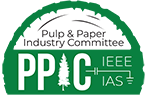Technical Program
The Conference Technical Program provides paper industry engineers and maintenance professionals valuable knowledge that can be applied to daily mill responsibilities.
Conference participants will:
- Learn about changes in electrical engineering, maintenance and safety practices, standards and codes.
- Experience equipment upgrades in other plants, hear about the projects that worked and the ones that didn’t.
- Acquire skills in generator and motor protection, determining relay settings and troubleshooting failures.
- Discover how to justify electrical upgrades with an emphasis on efficiency, reliability and safety.
- Network with other attendees that are extremely knowledgeable and actively working every day in the industry to make industry facilities, safer and more competitive.
The PPIC technical program is developed over the course of a 2 year period by dedicated members of the IAS Pulp & Paper Industry Technical Committee.
PAST EVENTS
2024 Schedule
2023 Schedule
2022 Schedule
2021 Schedule
PDH CREDITS
Professional Development Hours are awarded for all technical sessions and tutorials attended. In general, 3.5 PDHs are awarded for each morning or afternoon session. Half-day tutorials receive 4 PDH, full-day tutorials get 8 PDH. Certificates are available at the end of each technical session or tutorial.
2025 TECHNICAL CONTENT
– Subject to Change –
PAPERS PRESENTED
Experience with Online Ground Fault Protection
in Medium Voltage Drive Systems
Stan Simms
Metrology & Electrical Motors
Papa Diouf
Emergency Conversion
Greg Drewiske
Medium Voltage Power Distribution &
Control Assemblies Configuration for
Controlling Multiple Induction Motors
Stan Simms, Donovan Gray,
Thomas A. Farr, Marc Elliott
Changes in IEEE C37.20.7 that Impact
Arc Testing & Medium Voltage MCCs
Stan Simms, Richard Bhalla,
Thomas A. Farr, Kyle Harrison
Relay-Based Electrical Signal Analysis for
Incipient Motor Failure Detection–Field Success
Christine Crites, Balakrishna Pamulaparthy,
Mike Ramlachan, Kola Y Bhargav Reddy
Reactive Power Modeling in
Industrial Power Systems
Alex Wu
A Comparison of Protection Based Arc
Flash Mitigation Techniques
Craig Wester, Wayne Hartmann,
Don Elliot, David Virost
Complying with NFPA 70B & Minimizing the
Total Cost of Ownership of Medium Voltage
Switchgear Using Condition Monitoring
Harshavardhan Karandikar,
Marcelo Valdes, Danny Kliebert
Learned Lessons Commissioning a Relay-Based
Synchronous Motor Excitation Control System
Christine Crites, Robert Muziol, Ken Apfelbeck
Do Local Authorities Having Jurisdiction
Embrace Changes in Electrical Installation
Standards?Not Exactly!
Dave Durocher, John McCamish,
Thomas Domitrovich
Attracting Global Professionals to the
PPIC Conference: A Collaborative Approach
Leveraging Social Media
Dante Barragan, Marc Elliott, Robin Stroud
Letting the Smoke Out–What to Do
if Your Motor Fails
Anthony Soellner
Motor Service Life vs. Design Life
Anthony Soellner
AMI Untitled Paper
Alejandra Fernanda
Is There Synergy Between an ESP & an EMP?
Terry Becker
Is the Electrical Protective Device
Programmed & Tested?
Terry Becker
Analysis of Shaft Voltage in Electric Motors
Driven by Matrix Converters: A Comparative
Study with Conventional Drives
Arash Nejadpak
Real World Application of Arc Quencher Devices
Mike Bukovitz, Eric Abel
KEYNOTE PRESENTATION
The Paper Industry in the United States…
Yesterday, Today, & Tomorrow
Richard Phillips (Professor of Forest Biomaterals–NC State University)
PANEL DISCUSSION
NFPA70E & Human Factors
You’ve done all the training, coaching, reminding, and nagging. Why is it your Qualified Persons still seem to struggle with doing the right things all the time? This panel will discuss experiences and strategies for helping your Qualified Persons on the right path.
Greg Drewiske (Billerud)
SUBCOMMITTEE SESSIONS
Drives & Controls Systems
Power Distribution Systems
Process Control, Engineering, Maintenance & Construction
Safety & Training
ATTENDEE FAVORITE
Unusual Failures
Warren Hopper (Retired)
TUTORIALS
Building or Updating an Electrical Maintenance Program
4 hours
Terry Becker (TW Becker Electrical Safety Consulting)
This workshop will provide an interpretation and a process to review and apply NFPA70B or CSA Z463 in building an Electrical Maintenance Program or reviewing and updating an existing EMP. The ANSI/NETA Maintenance Testing Specification will also be reviewed. This will be an interactive team approach where we will all act as Electrical Safety/Maintenance Committee Members.
Documentation will be provided as pre-work gap analysis and to review NFPA70B and CSA Z463’s requirements. An Electrical Maintenance Program Workflow will be reviewed. A possible framework/table of contents of an EMP will be reviewed, along with discussion and review of a qualitative risk assessment process to make decisions related to maintenance strategies, inspection and test procedures and maintenance intervals for a generic electrical equipment asset list.
Steam Turbine & Generator Controls: Breathing Life Into Old Iron with New Controls
4 hours
James Bartley (MSHS Sales Engineer)
Richard Pitt (MSHS Consulting Sales Engineer)
Steam turbines if maintained last for a long time and are important in the plant eco-system, removing waste bi-products and offering electrical power via base-load or island power generation. We will discuss applications, types of turbines and methods for control. The importance of proper and holistic integration of governors, actuation, AVR, generator protection, vibration monitoring, safety systems and HMIs. We will discuss how to meet modern safety and insurance standards (API and SIL-3) and contribute to plant profitability.
AC Induction Motor Construction & Selection
4 hours
Papa Diouf & Charles Blankenship (IPS)
This tutorial provides a comprehensive overview of AC induction motors, covering their fundamental principles, construction, operational characteristics, and maintenance requirements. Beginning with an introduction to AC motor theory, the tutorial explores key concepts such as magnetism, torque, and motor operation, including different NEMA designs and speed-torque characteristics. The construction of AC motors is examined in detail, highlighting rotor and stator designs, insulation techniques, and winding types. Motor temperature considerations, including insulation classes, thermal ratings, and environmental impacts, are also discussed to ensure proper application matching. Various enclosure types and their advantages and disadvantages are reviewed, along with a thorough examination of essential motor accessories, including temperature detectors, encoders, and vibration monitoring systems. Additionally, the tutorial delves into bearing selection, lubrication methods, sealing techniques, and maintenance best practices to enhance motor reliability and longevity.
This guide serves as a valuable resource for engineers, technicians, and industry professionals seeking a deeper understanding of AC induction motors and their optimal operation in diverse applications.
